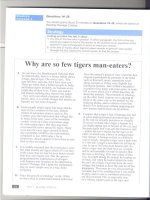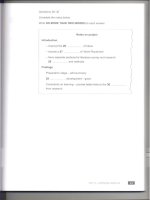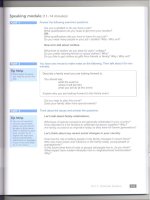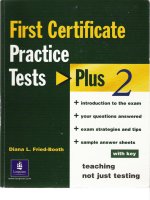VOCABULARY 6: MONEY AND SHOPPING – PRACTICE TEST No. 2
Bạn đang xem bản rút gọn của tài liệu. Xem và tải ngay bản đầy đủ của tài liệu tại đây (137.46 KB, 6 trang )
VOCABULARY 6: MONEY AND SHOPPING – PRACTICE TEST No. 2
Exercise 1. Replace the words in italics with one of the phrases from the box.
in a sale
pay you back
save up
in debt
second hand
be well-off
annual income
can’t afford it
1. Kate’s car was owned by someone else before her.
2. We’re not going on holiday this year, because we are short of money.
3. Don’t worry, next week I’ll give you the money you lent me.
4. We decided t put money aside so we could buy a small boat.
5. I don’t want to end up owing a lot of money to the bank.
6. What exactly is the amount of your earnings every year?
7. I bought my DVD-player when the prices were reduced.
8. Mary used to have a lot of money, but she’s quite poor now.
Exercise 2. Complete the sentence with a compound noun formed from two words in the box. One
word is used twice. Some compounds are written as one word.
assistant
bag
book
carrier
card
cash
credit
cut
departmen desk
money
pocket
price
shop
store
t
1. Most parents give their children some ___________________to spend.
2. Perhaps you left your wallet at the ___________________when you paid.
3. Jane buys all her CDs cheap in a/an ___________________store.
4. I bought the new novel by Richard Francis in my local ___________________.
5. You can buy nearly anything in a big ___________________.
6. The ___________________who served me helped me buy what I wanted.
7. When I go abroad I always take a ___________________with me.
8. I brought my shopping home in a strong ___________________.
Exercise 3. Circle the correct word or phrase in each sentence.
1. Dora earns/gains/wins more money in her job than I do.
2. The factory workers asked for a rise in their income/reward/wages.
3. Paul borrowed/lent/loaned some money from me but didn’t pay it back.
4. I’m sorry, but we don’t accept credit cards, only cash/coins/money.
5. Is it all right if I pay with cheque/by cheque/from cheque?
6. We don’t exchange goods unless you still have the bill/cheque/receipt.
7. I’m afraid I’ve only got a $50 note. Do you have change/money/rest?
8. I still debt/owe/own the bank more than $5.000.
Exercise 4. Complete the shopping situation (1-8) with a remark (a-h)
1. I can’t decide whether to buy it or not, so I think_____
a. Not at all, madam. It’s a pleasure.
2. Have you got a pair like this in red? _____
b. I’m just looking.
3. Can I pay by credit-card? _____
c. Could you explain how it works?
4. Can I help you? No, thanks, _____
d. How would you like to pay?
5. That’s $45, please _____
e. We’re out of stock at the moment. Sorry.
6. Thanks very much for your help. _____
f. I’ll leave it.
7. There isn’t a price label on this shirt. _____
g. Sorry, we only accept cash or cheques.
8. This computer looks difficult to use. _____
h. How much is it?
Exercise 5. Complete each phrase with a suitable word from the box.
bar
box
bunch
carton
loaf
packet
tin
tube
1. a ___________ of biscuits
5. a large ___________of tissues
2. a ___________of toothpaste
6. a ___________of chocolate
3. a ___________of tomatoes
7. a ___________of bananas
4. a ___________of milk
8. a ___________of bread
Exercise 6. Decide which answer best fits each space.
Shopping in the street
When I (1.)_______ shopping, I enjoy visiting street (2.) _______and looking for (3.) _______. I
wander around looking at each (4.) _______, and asking about (5.) _______. Many (6.) _______on sale are
less (7.) _______than those in high-street shops, though the (8.) _______is not always as good. It also
High School for Gifted Students - HNUE
1
depends on how much you want to (9.) _______. Clothes are often (10.) _______, but it is difficult to (11.)
_______them on. It’s always (12.) _______looking at second-hand books, because you can (13.) _______a
lot of money in this way. Fresh fruit and vegetables are usually good (14.) _______, and there is always an
excellent selection. The main problem is whether you can carry home lots of (15.) _______bags!
1. A. like
B. make
C. go
D. do
2. A. markets
B. trades
C. shops
D. sales
3. A. values
B. cheaper
C. special
D. bargains
4. A. counter
B. table
C. stall
D. department
5. A. costs
B. prices
C. values
D. figures
6. A. produces
B. shopkeepers
C. offers
D. figures
7. A. expensive
B. cost
C. priced
D. cheaper
8. A. expense
B. package
C. kind
D. quality
9. A. spend
B. use
C. make
D. cash
10. A. fashion
B. cheaper
C. worn
D. logical
11. A. purchase
B. carry
C. try
D. wrap
12. A. worth
B. more
C. been
D. time
13. A. borrow
B. spend
C. save
D. count
14. A. health
B. value
C. time
D. taste
15. A. hand
B. papers
C. more
D. heavy
Exercise 7. Circle the most suitable word or phrase.
1. That new clothes shop has a lot of very good bargains/sales.
2. On Saturday morning the High Street is full of customers/shoppers.
3. It costs $9, so give her $10, and she’ll give you 41 change/rest.
4. I don’t go to that supermarket because it’s a bit priced/pricey.
5. You can’t return goods without the original recipe/receipt.
6. Supasoft Soaps are for sale/on sale here.
7. A carrier bag is free with each buyer/purchase over $10.
8. If you pay cash, we can give you a 10 percent cutting/discount.
9. How much did you pay/spend for your new shoes?
10. This is a good shoe shop, but the costs/prices are very high.
Exercise 8. Rewrite ach sentence so that it includes the word given in brackets.
1. I can’t manage to see what the price is. Let’s ask inside. (make)
→_______________________________________________________________________
2. Is this coat the right size? Can I check? (try)
→_______________________________________________________________________
3. Two masked men robbed the supermarket yesterday. (held)
→_______________________________________________________________________
4. You need a new coat. Your old one is too small. (grown)
→_______________________________________________________________________
5. I’ve been shopping all morning. I feel exhausted. (worn)
→_______________________________________________________________________
6. I’ll come and collect the goods on Thursday. (pick)
→_______________________________________________________________________
7. Sorry, we don’t have any bread left. (run)
→_______________________________________________________________________
8. Are you going to the chemist’s? (calling)
→_______________________________________________________________________
9. I don’t like supermarkets. I can’t bear the queues. (put)
→_______________________________________________________________________
10. I don’t know whether to buy this car. I’ll consider it. (over)
→_______________________________________________________________________
Exercise 9. Complete each sentence with a word from the box. Use each word once only.
chang deliver find
fit
go
help
order pay
queue serve try
wrap
e
1. You have to ___________ for ages to pay in this supermarket.
2. In the London area, we ___________furniture free of charge in our van.
High School for Gifted Students - HNUE
2
3. The trousers I bought are the wrong size. I’d like to ___________them.
4. Could somebody ___________me, please? I’ve been waiting for ten minutes.
5. Is this a present? Would you like me to ___________it for you?
6. I like the colour of this skirt, but it doesn’t ___________me.
7. Good morning, madam. Can I ___________you?
8. We don’t have your size at the moment, but we can ___________it for you.
9. Can you ___________at the other cash desk, please?
10. Would you like to ___________on this green pair?
11. I went shopping but couldn’t ___________exactly what I wanted.
12. Food is so expensive now. Prices seem to ___________up all the time.
Exercise 10. Complete each sentence (1-10) with a suitable ending (a-j). Use each ending once.
1. I bought my new television from a department_______
a. centre near the public library?
2. Don’t forget to write a shopping _______
b. register doesn’t work.
3. Can you pay over there? This cash _______
c. of that new shop next to the post office.
4. Most of the tourists went bargain _______
d. size box of paper tissues.
5. Why don’t we go to the new shopping _______
e. store in the town centre.
6. Quite late at night the little corner _______
f. shop down the road is still open.
7. It would be much better to buy an economy_______
g. assistant in a shoe shop.
8. Don’t forget that we have to stop at the filling _______
h. list before we go to the market tomorrow.
9. There’s a very nice suit on display in the window _______ i. station to get some petrol.
10. Mary has just started work as a shop _______
j. hunting in the old part of the city.
Exercise 11. Choose the most suitable word or phrase to complete each sentence.
1. I bought these jeans very cheaply in the ________.
A. bargains
B. reductions
C. sales
D. discounts
2. The washing instructions for this shirt are given on the ________.
A. label
B. badge
C. notice
D. mark
3. All the small ________closed their shops in protest at the price rises.
A. shop assistants
B. shoppers
C. shopkeepers
D. shop stewards
4. We don’t have the CD, I’m afraid. It’s out of ________.
A. order
B. stock
C. shelf
D. sale
5. The street market was full of ________selling fruit and vegetables.
A. counters
B. boutiques
C. tables
D. stalls
6. The shop opposite my house sells a variety of ________.
A. objects
B. purchases
C. goods
D. productions
7. I’m sorry, but the dress you want is not ________in red.
A. possible
B. economical
C. suitable
D. available
8. Every Friday you can buy cheap vegetables in the market ________.
A. street
B. place
C. store
D. sales
9. I like street markets, because you shop in the open ________.
A. prices
B. sunshine
C. bargains
D. air
10. I like your new car. What ________is it?
A. brand
B. make
C. name
D. label
Exercise 12. Complete each sentence with a word from the box. Use each word once only.
baked beans
chocolates
jam
orange juice
soap
breakfast cereal
flowers
margarine
paper tissues
toothpaste
1. a tube of __________________
6. a box of__________________
2. a bunch of __________________
7. a packet of __________________
3. a pot of __________________
8. a bar of__________________
4. a tin of __________________
9. a carton of __________________
5. a box of __________________
10. a tub of __________________
Exercise 13. Match the word in the box with a suitable description (a-j)
advertisemen bargain catalogue deposit list
manager purse
receipt trolley
t
1. You push this in the supermarket and fill it with food ______________
2. You are given this as proof of buying something. ______________
High School for Gifted Students - HNUE
wallet
3
3. This tries to persuade you to buy something. ______________
4. You put money, especially banknotes, in this. ______________
5. This person is in charge of a shop. ______________
6. You might make this before you go shopping. ______________
7. Leave this if you can’t pay now but want to buy later. ______________
8. Do this if you want to get a better price. ______________
9. Coins are usually carried in this, especially by women. ______________
10. Read this to find description of goods. ______________
Exercise 14. Use the word given in brackets to complete the passage.
Supermarkets
Nowadays, a great (1. vary) ______________of different food is available from large supermarkets.
There are rarely any (2. short) ______________of fresh food, and there is far less (3. likely)
______________of our having to rely on (4. freeze) ______________products. Does this mean that
supermarkets have become the most (5. success) ______________shops of all time? Certainly they seem to
have made some kinds of food less (6. expense) ______________and most people enjoy shopping in them.
There has been a (7. reduce) ______________in the number of (8.complain) ______________made against
supermarkets in recent years. The assistants are no longer (9. polite) ______________, but smile and try to
be helpful. Above all, supermarkets have shown a (10. wiling) ______________to listen to their customers,
and to adapt to customer’s needs.
Exercise 15. Choose the best answer to complete the following passage.
Street markets
Most people enjoy looking for (1.)______in street markets. It can be very enjoyable walking around
the (2.) ______, among the crowds of (3.) ______, and trying to spend as (4.) ______as possible. Of course
it depends (5.) ______the market. In fruit and (6.) ______markets, there is usually a wide variety of (7.)
______produce, but it may not be cheap. There may be goods at (8.) ______prices at the end of the day,
however. Clothes markets can be a problem, as it is difficult to (9.) ______on new clothes in the open (10.)
______! My favorite are antique markets, where although there is not much (11.) ______of finding valuable
objects which are also cheap, you can enjoy yourself looking at all the things for (12.) ______. Whatever
kind of market you look (13.) ______, and whether you buy things or not, you usually (14.) ______up
feeling completely worn (15.) ______. Still, it is an interesting way of shopping.
1. A. cheap
B. sale
C. inexpensive
D. bargains
2. A. tables
B. stalls
C. boxes
D. stores
3. A. shoppers
B. public
C. buys
D. goods
4. A. little
B. soon
C. late
D. is
5. A. from
B. with
C. on
D. to
6. A. salads
B. green
C. farm
D. vegetable
7. A. new
B. fresh
C. young
D. early
8. A. half
B. bottom
C. reduced
D. down
9. A. look
B. try
C. have
D. take
10. A. time
B. shop
C. light
D. air
11. A. likelihood
B. instead
C. in spite
D. luck
12. A. that
B. all
C. sale
D. others
13. A. round
B. for
C. up
D. out
14. A. shut
B. bring
C. get
D. end
15. A. clothes
B. however
C. out
D. through
Exercise 16. Circle the most suitable word or phrase.
1. I haven’t got enough money. I’m afraid. Could you borrow/lend me some?
2. This car is too expensive. We can’t afford/pay it.
3. There’s a small flat to hire/let in Bridge Street.
4. How much do you earn/gain in your new job?
5. She’s a good dentist, but she doesn’t charge/spend too much.
6. I bought this coat in the sales. It was decreased/reduced a lot.
7. Jack made his fortune/treasure buying and selling property.
8. How much do you reckon/value that house would cost?
Exercise 17. Replace the word or phrase in italics with a word or phrase from the box which as the
opposite meaning.
High School for Gifted Students - HNUE
4
cash
generous
profit
well-off
poverty
purchase
take out
worthless
1. I was surprised by how mean Charles was. →_____________
2. Janet says that she is very hard up at the moment. →_____________
3. Last year their business made a huge loss. →_____________
4. I’d like to pay in $100 please. →_____________
5. Most people in the city live in great prosperity. →_____________
6. The manager insisted that I paid by cheque. →_____________
7. Jean was able to make only one sale during the morning. →_____________
8. The old painting I found in the loft turned out to be valuable. →_____________
Exercise 18. Complete each sentence with a word from the box. Use each word once only.
safe
wealth
pension
rent
tip
credit card loan
receipt
1. The old couple had only a small _______________ to live on.
2. My uncle Sam acquired his considerable _______________selling cars.
3. David never carries cash with him and pays for everything by _______________.
4. I wouldn’t have been able to buy my boat without a bank_______________.
5. The shop won’t charge any goods without the original _______________.
6. Keith didn’t like the waiter so he didn’t leave a _______________.
7. The house is not in very good condition so the _______________is low.
8. We keep all our money and valuables in this _______________in the floor.
Exercise 19. Match each sentence (a-h) with a suitable response (1-8). Use each response once only.
a. Who do I make the cheque out to? ______
1. Sorry, but it’s not for sale.
b. We seem to be spending a lot of money lately. 2. I’m saving up to buy a new motorbike.
______
c. The house has burnt down! What are we going to 3. Perhaps we should try to economize a bit.
do? ______
d. How much do you want for this drawing? ______ 4. Yes, my Aunt Clara left it to me.
e. Did you inherit this house? ______
5. Well, we’ve nearly paid it all back.
f. Do we still owe the bank any money? ______
6. To JB Woolbury PLC.
g. Can we change money at the hotel to pay the bill? 7. I think they accept travelers cheques anyway.
______
h. Why are you putting so much money in the bank? 8. Don’t worry, we’re insured.
______
Exercise 20. Choose the most suitable word or phrase to complete each sentence.
1. I bought these shoes in the sale. They were a real ________.
A. cheap
B. economy
C. bargain
D. purchase
2. If you put your money in the bank, it will earn ten percent _______.
A. interest
B. profit
C. deposit
D. investment
3. John asked his parents if they would pay off his _______.
A. rents
B. debts
C. accounts
D. credits
4. Adults have to pay $8 to get in, but children under fourteen get in _______.
A. free
B. nothing
C. penniless
D. open
5. I’m trying to save for my holidays so I’m _______some money each week.
A. putting in
B. putting aside
C. putting behind
D. putting up
6. Just a minute! You’ve forgotten to _______your cheque!
A. mark
B. make
C. place
D. sign
7. The blackmailer asked for the money in used _______.
A. notes
B. cheques
C. paper
D. cash
8. I gave the assistant ten euros and she gave me four euros _______.
A. rest
B. money
C. coins
D. change
Exercise 21. Use the word given in brackets to form a word that fits in the space.
Money! Money! Money!
Helen had always dreamed of becoming a (1. wealth)____________woman, and imagined living in a
(2. luxury) ____________mansion, and how her friends would praise her (3. generous) ____________when
she gave them expensive presents. In reality she was usually hard up. She had some (4. save)
____________and a small life (5. insure) ____________, but her antique shop was not really very (6. profit)
____________. Every time she took money out of the bank, the (7. cash) ____________checked her
High School for Gifted Students - HNUE
5
account, and told her how little there was in it! Helen had taken out a (8. lend) ____________a month
before. How could she repay it? Then one day she noticed an old painting in her shop. She had thought it
was (9. worth) ____________but as she brushed away the dust, she saw the (10. sign) ____________at the
bottom. It said “Renoir”! She was rich at last!
Exercise 22. Complete each sentence with a word or phrase formed from “pay”. Each space represents
one word.
1. You can pay the full price now, or make six monthly __________.
2. If you lend me the money, I’ll __________ __________ __________next week.
3. I haven’t got enough money to __________ __________the suit now.
4. We __________ __________ a lot of money on decorating this house.
5. I must do something about all these __________bill.
6. Please make the cheque __________ to R.D. Smith.
7. Take this money and __________ __________ __________ to the bank.
8. I like my job, and it’s very __________ __________.
Exercise 23. Match the words in the box with a suitable definition (a-h). Use each word once only.
accountant cashier
heir
pensioner agent
customer
investor
swindler
1. Someone who inherits money or property. _____________
2. Someone who has retired. _____________
3. Someone who keeps or checks financial records. _____________
4. Someone who buys things in a shop. ____________________
5. Someone who pays out money in a bank. _____________
6. Someone who represents others in business. _____________
7. Someone who puts money into a business. _____________
8. Someone who cheats people out of money. _____________
Exercise 24. Decide which answer best fits each space.
Money matters
Are you always (1.)_______ up? Do you often have to (2.) _______money from your parents
whenever you need a little extra (3.) _______? If you (4.) _______too much, and save too little, you will end
up with more (5.) _______than friends. You know the solution, of course; just save a small (6.)
_______every month. Most banks will pay (7.) _______on your savings, and you will soon be able to (8.)
_______all those things which seemed to cost too much before. The trouble is, you’re a university student,
and many banks treat you like a child. But not us. If you open a/an (9.) _______with Smith Fulton Bank
before October 31st, we’ll not only send you your own (10.) _______book and credit (11.) _______, but
you’ll also receive a copy of our booklet “Putting Money (12.) _______for Your Future’. Smith Fulton can
pay your (13.) _______, help you with special student (14.) _______, and your friendly branch (15.)
_______can give you advice for the future. We believe in you. Why not believe in us and open an account?
1.
A. shut
B. hard
C. debt
D. money
2.
A. borrow
B. lend
C. save
D. pay
3.
A. cheque
B. pension
C. wealth
D. cash
4.
A. sign
B. spend
C. cost
D. cheat
5.
A. owe
B. loans
C. debts
D. profits
6.
A. amount
B. number
C. note
D. rest
7.
A. receipts
B. credits
C. rents
D. interest
8.
A. lend
B. economize
C. afford
D. spend
9.
A. cheque
B. customer
C. bill
D. account
10. A. loan
B. cheque
C. cash
D. money
11. A. plastic
B. tip
C. card
D. cheque
12. A. aside
B. up
C. inside
D. work
13. A. sales
B. bets
C. bargains
D. bills
14. A. coins
B. loans
C. fortunes
D. pensions
15. A. miser
B. swindler
C. manager
D. cashier
High School for Gifted Students - HNUE
6









